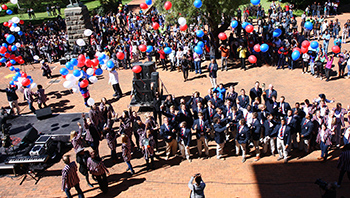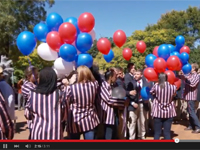
Both staff and students celebrated the Shimlas, KovsieTennis, and KovsieNetball’s achievements.
Photos: Hannes Pieterse |

Video clip
Photo Gallery
In this week of graduation ceremonies, the University of the Free State had more than its academic achievements to celebrate. The Shimlas’ brilliant triumph in the Varsity Cup as well as the achievements by KovsieTennis and Kovsie Netball was celebrated at a colourful event on the Bloemfontein Campus.
At the celebrations, which were well supported by the campus community, the Vice-Chancellor and Rector, Prof Jonathan Jansen, congratulated all three teams on their outstanding achievements. Not only did the Shimlas walk off with the Varsity Cup, they also won every game they played. AJ Coertzen, the Shimlas’ captain, said: “Although we were well prepared and physically fit, the fact that we played for one another contributed much to our success. As a team, we have grown from friends to brothers.”
KovsieTennis was congratulated on wearing the USSA tennis crown for the fourth consecutive year. In addition, they have the following triumphs to their name: 2007 – SASSU (South African Students Sports Union) (Ladies); 2008 – USSA (University Sport South Africa) (Ladies) and 2009 USSA (Men). Duke Munroe, captain of the KovsieTennis team took the opportunity to thank the team personnel. He believes that hard work behind the scenes by the coach, Marnus Kleinhans, and the team manager, Janine de Kock, contributed greatly to the team’s success.
KovsieNetball was also praised for their successes. In 2014, under the captaincy of Karla Mostert, they won gold at the Varsity Netball championships. They also won the National Premier League. The UFS is also proud of its netball players in various national teams: SA Under 19-23, the Protea groups, and the SA University team.
At the celebrations, Karla said: “The environment and the people you surround yourself with dictate how easily you achieve success. Our achievements and successes are evidence of the quality of the coaches, supporters, and facilities available to us.
After the event on the Red Square, the teams made an appearance in the Callie Human Centre, where they were enthusiastically congratulated by graduands, their families and the university management. Dr Khotso Mokhele, Chancellor of the UFS, also praised the teams for their achievements. “You are a team without individual stars. That is the sort of team I want to be part of.”